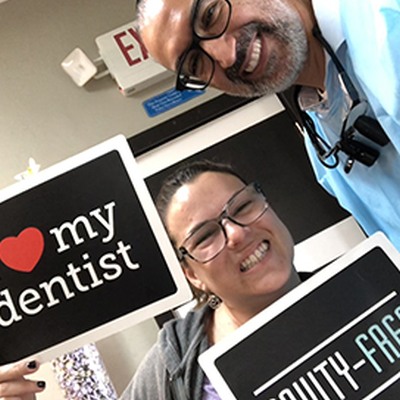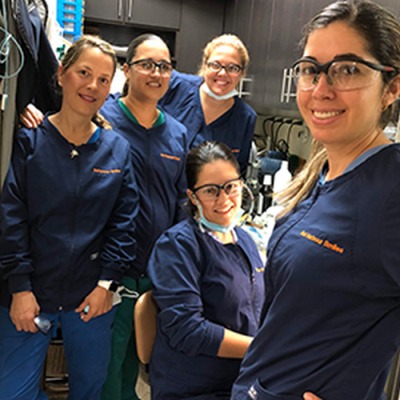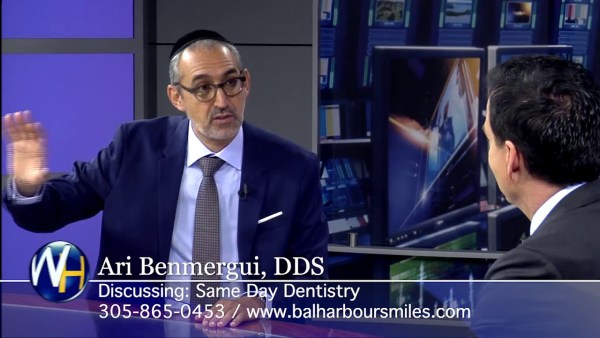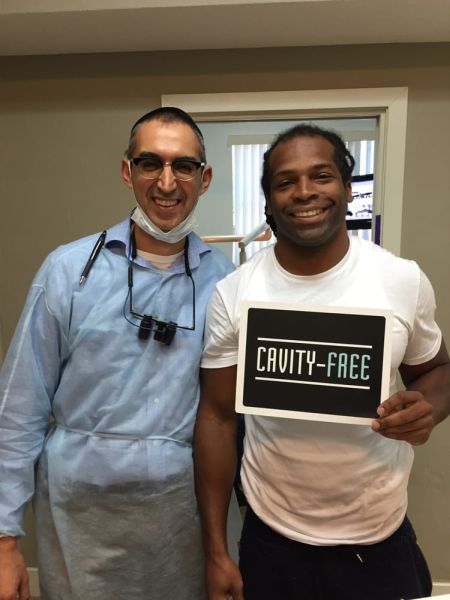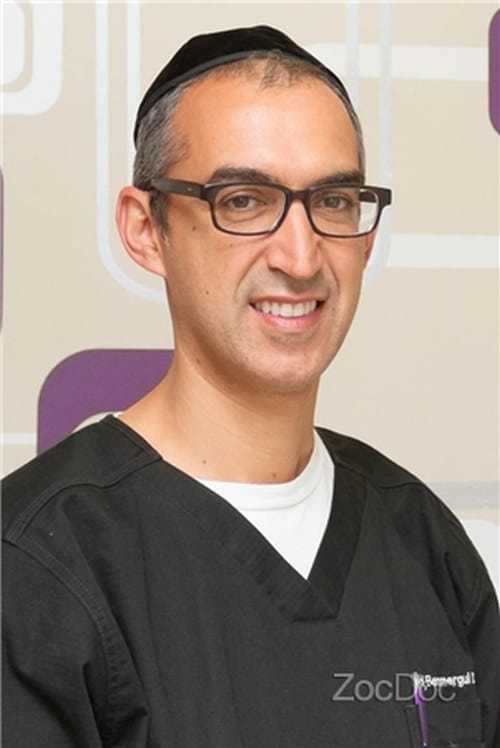Dr. Yudah Ari Benmergui has been practicing dentistry for more than 19 years He completed his undergraduate studies at FIU, with a Biology major. In 1998 he graduated for Columbia University in New York City with a degree in Doctor in Dental Surgery. He has been practicing in his current Miami Beach location for 20 years. Since he began practicing dentistry, Dr. Benmergui has made it a point to stay up-to-date on all the cutting-edge technology in the field. He regularly takes continuing education classes, ensuring that each of his patients receives the most comprehensive and advanced dental care possible.
Dr. Benmergui has an associate fellowship within the World Clinical Laser Institute and is a member in good standing of the Dental Organization of Conscious Sedation. He is a mentor at the CERECdoctor.com center in Scottsdale, AZ. Dr. Benmergui and his dental office have been featured by the following channels: CBS, ABC and NBC.
Dr. Yudah Ari Benmergui, DDS, offers cosmetic dentistry services to patients in Miami Beach, FL, Bal Harbour, FL, Surfside, FL, Coral Gables, FL, Miami Shores, FL, Aventura, FL, Fort Lauderdale, FL and the surrounding areas.
Dental Implants
Missing teeth can be embarrassing, causing people to hide their smile and lose their self-esteem. The space that missing teeth create can easily become infected with bacteria, causing other teeth to shift out of place, and making it difficult for people to speak or eat correctly. The team at Bal Harbour Smiles are sensitive to the hardship a missing tooth can create. We provide dental implants so that our patients can regain their self-confidence, improve their health, and approach life boldly.
Installing implants is a complex procedure that requires us to replace their missing teeth in a safe and natural way. We know that there are multiple dental providers to choose from, so the team at Bal Harbour Smiles are constantly looking for ways to improve the overall experience of our patients. Our office is located in Surfside and we offer patients the opportunity to restore missing teeth in a way that looks natural and beautiful.
All-on-4 Dental Implants
All-on-4® is a minimally invasive method of placing a full mouth of implants only using four implants to support a full arch (upper or lower) fixed non-removable replacement teeth. All-on-4® allows you to have a full set of teeth without having to undergo multiple surgeries and replacements to place a full set of implants in your mouth. The greatest thing about All-on-4® is that the procedure we can typically complete it in our office during one appointment under local anesthesia. For our patients who have lost all their teeth or may need to have the remaining teeth pulled due to decay, this is an amazing advancement that allows them to have a full set of teeth without undergoing multiple procedures. Simultaneously, this solution gives patients the kind of teeth that look real and act like the original teeth.
Who Should Get All-on-4®?
The simple answer is that anyone who has lost teeth and wants to have a permanent good-looking set of replacement teeth will benefit from dental implants. The All-on-4® systems offer people a chance to live a full and healthy lifestyle by replacing the teeth with implants over removable dentures. The ideal candidate for All-on-4® implants is someone who already wears dentures or is already missing multiple teeth. Additionally, this is an ideal procedure for someone that does not have the bone density to support a full set of individual implants, the time to have individual implants placed, or the budget to pay for them. The All-on-4® procedure is faster and more affordable.
Who Should Get All-on-4®?
There are several ways in which All-on-4® implants are better than dentures. Patients take care of All-on-4® implants in the same way they care for their natural teeth by brushing each day. The implants also operate in the same way as natural teeth, so the patient does not have to be cautious of what he or she eats. Along with the fact that patients do not have to remove All-on-4® implants when eating or cleaning the teeth, there is also no need for uncomfortable wires or brackets to hold the implants in place. Even more importantly for patients, the dental implants allow anyone to eat what the heart desires. You do not have to worry about hot or cold affecting your dentures. You also can bite down with up to 70 percent more force, which allows you to eat the foods that you love. Finally, All-on-4® implants look exactly like your natural teeth. No one will be able to tell that you are wearing a dental prosthetic. From a dental health perspective, it is important to note that when you have All-on-4® implants, it is going to prevent bone deterioration in the jawbone and ultimately restore your facial features by fighting resorption. The process of resorption involves the implants stimulating the jaw to send a message to the body that the jaw is supporting teeth once again. Resorption will help the jawbone to regain some of the mass that it has lost previously. Many of our patients who visit our office notice a difference in their facial structure as a result.
The Process of Getting All-on-4® at Bal Harbour Smiles
Typically, the surgery takes approximately two hours and 30 minutes per arch. We can install your All-on-4® implants on your upper, lower, or both arches at the same time. While a dentist may make the process look easy, the surgery is a complex procedure that we can complete at an efficient pace. The process of getting All-on-4® implants can be laid out in four steps:
- The first step: A detailed examination where we will look at your records, existing conditions, whether you have a denture, what your facial structure needs are, and any other factors that may come into play when placing your implants.
- The second step: Typically involves CT scans, which are 3D pictures, of the jawbone. The scans include the positions of the replacement teeth, while also giving us critical information about where the bone sinuses and nerves are located for the implants.
- The third step: Involves creating a computer simulation of the implants, which we digitally position into the jawbone at the appropriate location to give you the most support from your replacement teeth. We can adjust the implants as need be and fabricate your new set of teeth for your needs.
- The fourth step: Finally, the most important step is the oral surgery. During surgery, we will provide you with anesthesia and then place the implants directly into your jawbone to secure your new set of teeth in place.
I need to replace two missing teeth next to each other. Can I just have one implant placed and attach it to one of my natural teeth and make a bridge?
Generally, this is not a good idea. We find that it is generally much better not to attach implants to teeth. We frequently attach implants to each other, which can improve strength and works well. So in a case like this, although it may be more expensive in the short term to place two implants instead of one, the long-term success is likely to be much better with the two implants.
I lost my upper back teeth on one side and have gone for years without doing anything about it. My sinuses always seem to bother me more on that side than on the side that I have back teeth. Could these problems be related to one another?
In a large majority of people who are missing their upper back teeth for a long period of time, is the increasing downward growth of the maxillary sinus. At birth, it is the size of a pea and progressively grows as the skull matures. This growth is at the expense of the surrounding bone. If you are considering replacing those upper back teeth with fixed teeth that stay in all the time, it may be necessary to perform a sinus elevation procedure to allow room for placement of dental implants into this area to support those teeth. This involves placement of bone and/or bone substitutes into an area which was previously occupied by the lower part of the maxillary sinus. Most importantly, this procedure increases the available bone use to place implants and restore the missing back teeth.
I've had dentures for several years and have lost a lot of jawbone. My lower dentures are floaters and I need help. Is there still hope for me?
In most cases, with the new options available today in the field of dental implants, some form of treatment is possible. We encourage people to get help as soon as possible if they are already having some problems with their current situation. These problems include excessive use of denture adhesives, chewing only soft food, unable to taste some foods, constant mouth sores, unhappy with the appearance of one's teeth and bite position (in some cases the nose and chin getting closer together). The sooner we correct the problems with dental implants, the more choices one has available for treatment. If you have any or all of the above symptoms, implants can very well be the answer for you.
I am missing all of my teeth and am now wearing a full upper and lower denture. I can no longer tolerate my lowers. Will I need an implant for every tooth I am replacing on the lower jaw?
It is not necessary to have an implant for every tooth that is being replaced. The number of implants necessary to provide support depends on the type of implants used and the type of teeth (removable vs. non- removable) that will be attached to the implants. A thorough oral exam and panoramic x-ray is all that is necessary in most cases, to determine which implant can be used and how many must be used. Sometimes additional X-rays or CT scans are used in more complicated cases.
I consulted a dentist several years ago about using implants to replace my lower denture and he told me that I did not have adequate bone available to place enough in-the-bone implants without danger of fracturing my now fragile jawbone. Are there any alternatives?
Because of the advances in the field of implantology, there are now more choices and techniques. It is rare for a person to not be able to receive an implant or a combination of implants. Today we have available many types of implants designed to accommodate multiple problems.
I had a root canal on a tooth that fractured and now it has to be removed. Can it be replaced with an implant or do I have to have a bridge or a partial?
Teeth that have root canals can fracture more easily than other teeth because they are weaker and somewhat dehydrated. They can sometimes be as brittle as glass. In the past, the best available treatment was to remove the tooth and file down the adjacent teeth to make a bridge - caps on the adjacent teeth with an attached "dummy" tooth between. Sometimes this still is the only way. However, in many cases an implant can replace the fractured tooth and we will not need to grind down a tooth to at all.
Am I a candidate for dental implants if I have crowded teeth?
Yes, you are. However, you may need to wear an orthodontic solution to create space for the implant first. It is unwise to attempt to place an implant when there is not sufficient space. Placing a dental implant without the proper amount of space will only exacerbate the challenges you have. It is important to time the procedure correctly and properly place the implant in an area that we prepare to support the implant. Since the process requires oral surgery, it pays to do it right the first time.
Is there a cutoff age for dental implants?
No, but there are a few requirements for dental implants that people of various ages may not meet. While we treat older patients and we believe it is never too late to improve a smile, the patient needs to have sufficient bone density to support a dental implant. Patients who wear dentures for a long time before seeking dental implants may struggle with a jaw bone that cannot properly support the dental implant. In this case, a mini-dental implant may be more appropriate. With a mini-dental implant, the metal post is shorter, requiring less bone structure to secure the implant.
Do I qualify if I have crooked teeth?
Certainly. At Bal Harbour Smiles, we treat patients who have crooked teeth. In many cases, our patients will begin an orthodontic treatment and receive a dental implant when it is nearly complete. That way, space can be created for the implant if necessary. Simultaneously, when the procedures are combined, your smile will be greatly improved. In rare cases, existing teeth do not respond like they should to an orthodontics treatment like braces or aligners. In this situation, a professional may recommend having that one particular tooth removed and replaced with a dental implant. This is something we can discuss with you in our Surfside dental office.
Can I get implants if I have an over/under-bite?
Yes. The position of your bite does not necessarily impact whether or not you qualify for dental implants. However, we will typically recommend that you consider solutions to address this issue. By first aligning your jaw, you can correct both the appearance and functionality of your smile.


